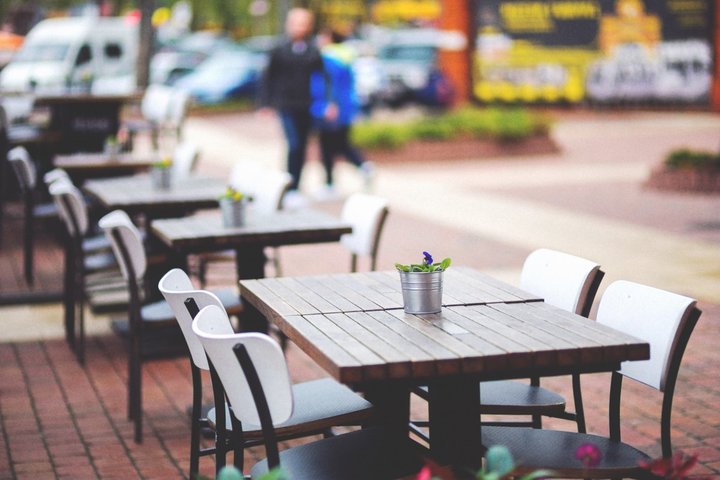
Photo: Creative Commons License.
Several times recently, I’ve found myself facing an uncomfortable new dilemma: When trying to cross the street, do I press a pedestrian signal button — against the advice of public health experts to avoid touching common surfaces — or do I just take my chances bolting across the street? Standing on a corner in Arcata or Eureka, I’m never quite sure what to do. But I know at many of these intersections, if I don’t touch that metal button, I’ll never get a pedestrian signal – and I’ll never be able to safely (and legally) cross the street. It’s just one way that COVID-19 is upending old assumptions about how we interact in public spaces.
Little by little, the local lockdown in response to COVID-19 is starting to ease. But it’s clear that precautionary measures to prevent the spread of the virus will be with us for a long time — probably at least a year or two. In other words, we’ll have to keep wearing masks, washing our hands obsessively, and staying 6 feet away from people not in our household for the foreseeable future.
Unfortunately, public spaces in our cities aren’t really set up for this new reality. That’s why the Coalition for Responsible Transportation Priorities is calling on the local governments in Humboldt County to adopt some simple, effective, low-cost measures right now to make our most ubiquitous public spaces — our streets and roads — safer for everyone. Here are a few of the problems we’ve identified, and the potential solutions:
- Problem: There are many small businesses — particularly local restaurants — that will not be able to survive for long with a dramatic reduction in customers allowed inside at any given time in order to maintain social distancing. With increased social distancing, indoor restaurant capacity is expected to dip to just 25% of “normal.”
- Solution: Relax parking standards in order to encourage restaurants and other businesses to take part of their business outdoors, into parking lots and/or adjacent on-street parking. We can have attractive and safe outdoor dining and retail areas that allow businesses operate at a feasible level while maintaining safe practices to prevent the spread of coronavirus.
- Problem: We have many locations where sidewalks or bike lanes either do not exist or are not wide enough for people to safely pass each other with 6 feet of distance, and where stepping far enough out into the street to maintain that distance creates a safety risk. With more people walking and biking lately, this is an increasing problem.
- Solution: Identify areas where walkers and bikers have to put themselves at risk in order to pass each other at a safe distance, and take action to address it. Actions can include: pop-up bike lanes and sidewalk extensions using traffic cones and other temporary materials, closing residential streets to through traffic, and additional driver education about yielding to pedestrians.
- Problem: We have “pedestrian-actuated” traffic signals which require people on foot to press a button and risk picking up the virus in order to legally cross the street.
Solution: Reprogram the traffic signals so that the walk signal comes on automatically with the corresponding green light.
In communities large and small, local governments around the country have already done all of these thing — and a lot more — in response to the COVID-19 crisis. There’s no reason that Arcata, Eureka, Fortuna or the County couldn’t adopt similar measures.
In fact, there have been some signs of local progress. At a recent meeting several Arcata City Councilmembers said they supported the idea of temporary sidewalk widening on G & H Streets — but so far, no changes have been made. In Eureka, there are plans to put up signs to identify the traffic signals that will produce a walk sign without pressing the button (it turns out some of them will — who knew?). But it’s imperative for them to do more — and quickly, before anyone else is forced to make an impossible choice between the risk of viral infection or and the risk of being hit by a car.
###
Colin Fiske is the Executive Director of the Coalition for Responsible Transportation Priorities.
CLICK TO MANAGE